July 8, 2024 | 04:13 GMT +7
July 8, 2024 | 04:13 GMT +7
Hotline: 0913.378.918
July 8, 2024 | 04:13 GMT +7
Hotline: 0913.378.918
At the foot of Pu Luong mountain, Phien Phang village in Yen Duong commune, Ba Be district (Bac Kan province) appears ethereal in the mist. Amidst bamboo forests stretching endlessly, houses intermittently appear and disappear. Phien Phang boasts bamboo forests as beautiful as those in martial arts films, with waterfalls cascading year-round, creating frothy white foam. Phien Phang also features terraced rice fields growing renowned Tai sticky rice, and below them are fish ponds teeming with salmon and Acipenser attracting numerous visitors.
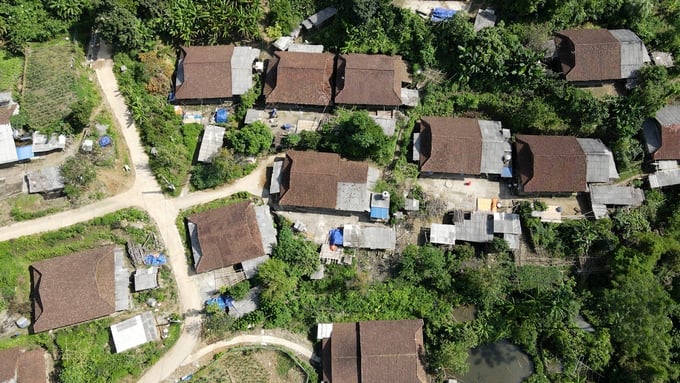
Phieng Phang village under Pu Lao mountain. Photo: Ngoc Tu.
This is Phieng Phang today, but over a decade ago, we visited Phieng Phang, a Dao ethnic village that seemed like a secluded world. Along the rugged 7km trail from the commune centre to the sparsely populated village, with harsh climate conditions, Phieng Phang residents struggled to make ends meet, children lacked warm clothing, and the village felt isolated from the outside world.
Ms Trieu Thi Tam has lived in the village since she was a young girl. Just a few years ago, every trip to the market required a whole day: buying vegetables, and salted fish, and then carrying them back up to the village. At that time, with only one rice harvest a year, there wasn't enough rice, and poverty plagued the villagers. Each year, the villagers farmed for about two months, spending the rest of their time gathering firewood and hunting for forest products.
"Back then, the road to the village was a narrow dirt path, steep and difficult to walk, especially in the rain. With no market for agricultural products, people were almost entirely self-sufficient", Ms Tam shared.
Reflecting on those memories, Ms Trieu Thi Man, the Secretary of the Phieng Phang Hamlet's Party cell, couldn't help but feel sorry thinking about those difficult times of alternating between fullness and hunger. In this remote mountainous area, no one in the village ever imagined a better life.
Ms Man still remembers that at that time, there were over 30 households in the hamlet, all of them poor, struggling with subsistence agriculture, with young people unemployed and women staying home looking after children and grandchildren.
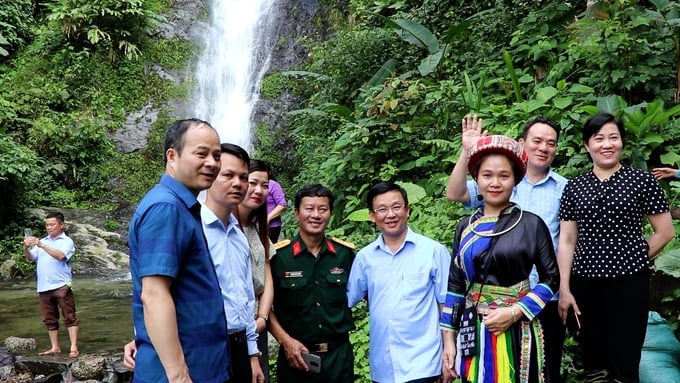
Tourists experiencing Pu Lau waterfall in Phieng Phang village. Photo: Ngoc Tu.
At this remote place, one day, unfamiliar visitors arrived at the village of Phieng Phang. They walked and talked animatedly, their eyes and gestures showing deep appreciation. At that time, Ms. Man didn't know why they came to the village. Over a week later, local officials mentioned that the authorities were studying the development of tourism in the village.
Listening to them discuss the potential and methods of tourism, Ms Mản was half-believing and half-skeptical. In this high mountain peak, who would come for tourism? Who would dare to cross the rugged mountain range? It looked beautiful, but how could tourism actually work here? Ms. Mản hesitated, and so did the villagers. At that time, no one in this Dao ethnic village believed that tourism or agriculture could thrive in this region.
However, the authorities persisted. Ms Man still remembers that after the survey, officials came down to discuss with the villagers about building a road to the village. Initially, it was to ease transportation for the locals, but later, it became part of the tourism development plan. "Then the excavator, and trucks carrying materials arrived at the village. That's when I started to believe they were serious", Ms Man recounted.
Phieng Phang, once quiet, suddenly became bustling. Excavators dug the land to pave the way, trucks transporting materials moved busily, and workers arrived every day in increasing numbers. The winding concrete road along the mountain slope gradually took shape. At this point, the villagers finally believed that tourism could indeed be developed here. The road to the village was opened, marking the beginning of the transformation that we now call the miracle on Pu Lau peak.
As someone deeply connected to the people of Phieng Phaqng, Ms Ma Thi Ninh, Director of Yen Duong Agricultural Cooperative (Yen Dương commune, Ba Be district), doesn't even remember how many times she crossed the mountains to reach the village. To develop tourism, the natural landscape must be beautiful, Ms Ninh discussed with the villagers about planting organic Tai sticky rice. Growing organic Tai sticky rice not only has high value but also enhances the scenery for tourists visiting. Initially, only a few households participated, but now the model has attracted more than 20 households, covering tens of ha.
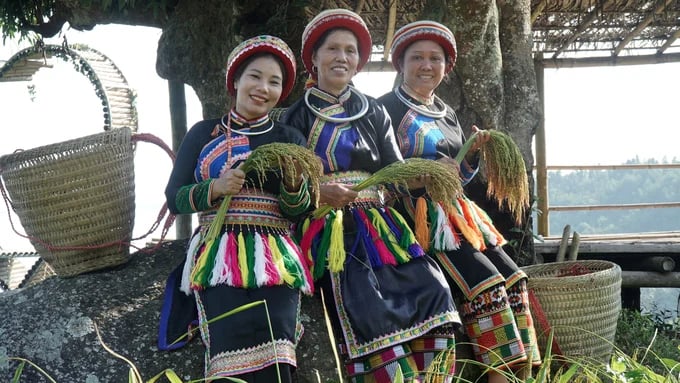
The people of Phieng Phang grow organic Tai sticky rice combined with experiential tourism. Photo: Ngoc Tu.
The Tai sticky rice fields now add a distinctive touch to the majestic and poetic scenery of Phieng Phang. This delicious and flexible rice variety is elevated through organic farming methods.
"Organic rice farming yields 2 to 3 times higher compared to before. Additionally, villagers have created attractive check-in spots for tourists, thereby increasing their income," said Ms Trieu Thi Tam, a member of Yen Duong Agricultural Cooperative, enthusiastically.
The Tai sticky rice product of Yen Duong Agricultural Cooperative has achieved a 4-star OCOP certification. The cultivation process and the rice product have been certified by the General Department of Standards and Quality (Ministry of Science and Technology) to meet Vietnam's organic agriculture standards. Moreover, the Tai sticky rice product also meets Japan's JAS organic farming standards.
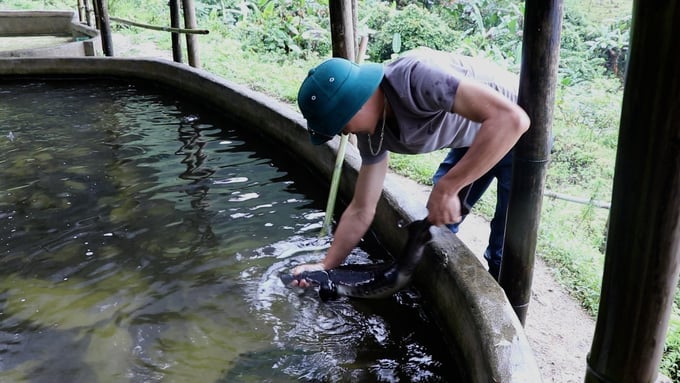
Mr Dang Hanh Dung's Acipenser and salmon farm combined with tourism brings high economic value. Photo: Ngoc Tu.
Mr Dung excitedly shared that when Phieng Phang became a tourist destination and more and more visitors came, he came up with the idea of raising sturgeon and salmon. At first, I had to go to other provinces to gain experience, but due to the water source and cool climate here all year round, the fish grew well.
Translated by Hoang Duy
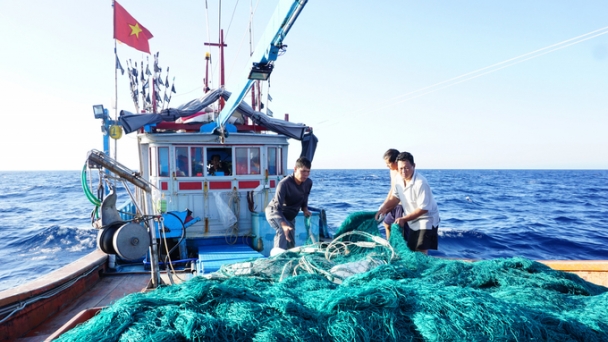
(VAN) From the beginning of 2024 until now, Khanh Hoa province has actively and decisively implemented many solutions to combat IUU fishing and achieved some positive results.
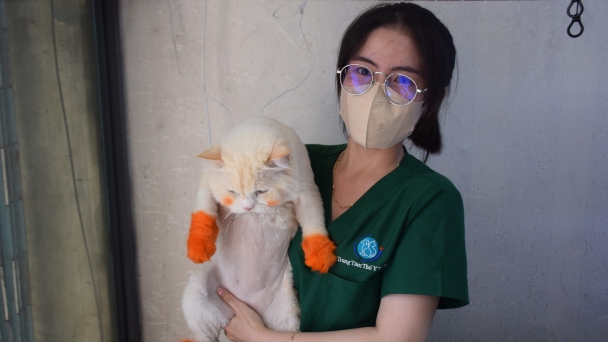
(VAN) Ensuring environmental sanitation is crucial for preventing and treating skin diseases in pets. However, Vietnam has not yet fulfilled this requirement.
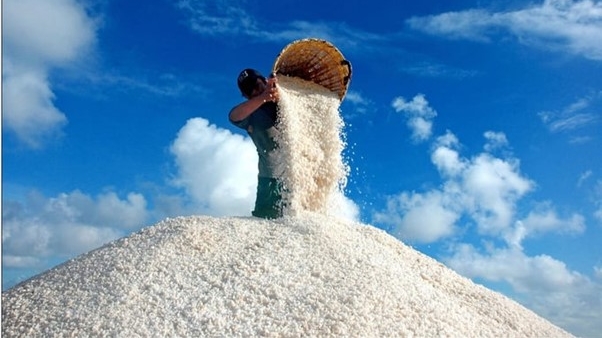
(VAN) On July 5 afternoon, Bac Lieu province organized a press conference to provide periodical press information for the second quarter of 2024 and information about the Vietnam Salt Industry Festival – Bac Lieu 2024.
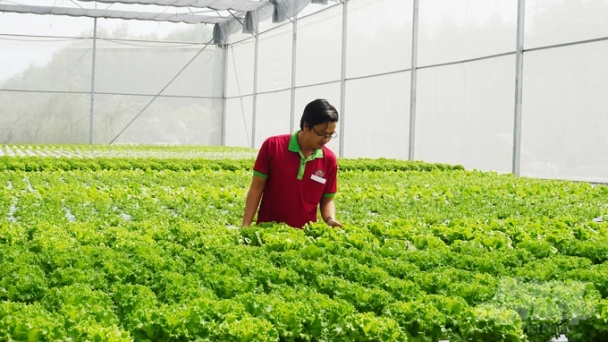
(VAN) Ho Chi Minh City aims for 75-85% of high-tech agriculture to account for the total value of agricultural, forestry, and fishery production.
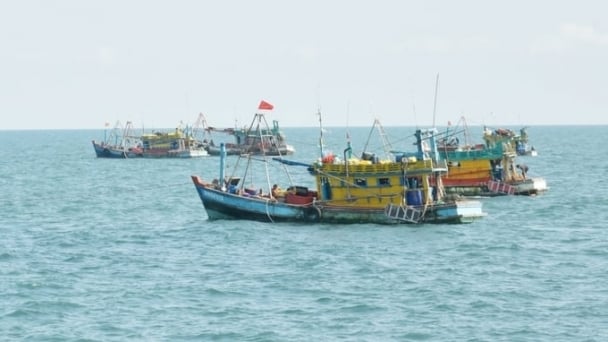
(VAN) On the afternoon of July 5, the Fisheries Surveillance reviewed the anti-IUU work of the first half and implemented tasks for the second half of 2024.
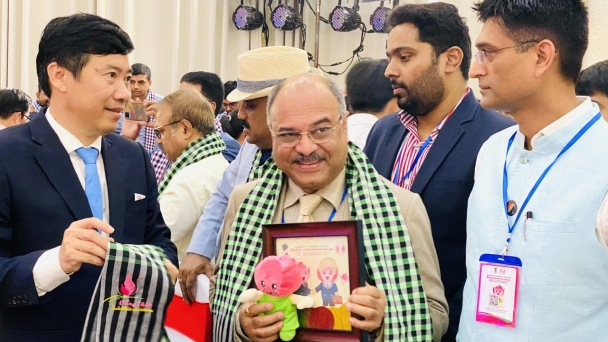
(VAN) Each year, Long Khanh A shawl weaving village supplies nearly 2 million bandanas of all kinds to the market. The scarves are sold to domestic and foreign markets.
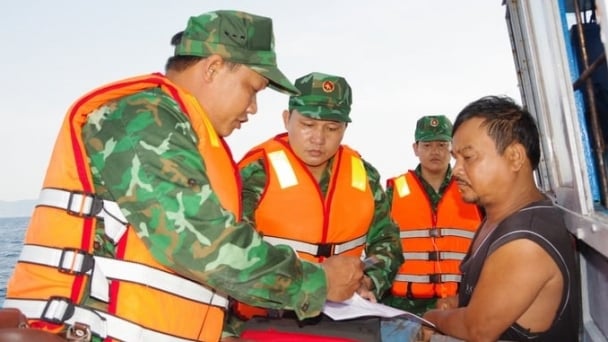
(VAN) Despite being very drastic in preventing fishing vessels from violating foreign waters, the 'picture' of combating IUU fishing in Binh Dinh still has dark color patches.